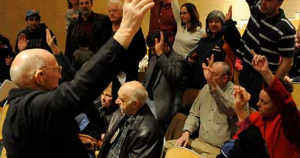
This week Nigel Farage has been defending UKIP’s “cash for seats” policy. According to The Times, the party’s elected MEP’s are encouraged to donate about £10,000 a year to the collective coffers. Refuse to cough up at your peril; deselection has been threatened for those who dare say no.
Farage has claimed it’s a way of preventing UKIP MEP’s from profiting from elected office- UKIP isn’t a career, it’s a way of life. With £52,500 take home pay, MEPs of all political persuasions don’t really need to skimp on the moules frites. But seemingly only those with cash reserves big enough to be UKIPpers need apply to Farage. All prospective UKIP MEPs are required to sign an agreement to donate at least 10% of their salary if elected.
This approach has been justly criticised; after all, it could – and would – limit potential candidates to those rich enough to afford the selection campaign and to cough up the 10% once elected, but I won’t be crying into pint of Leffe for lack of potential UKIP candidates. Do we expect sane policies from a party that wants to bring back smoking in pubs, abolish maternity leave and drop kick the UK out of the EU?
I know how expensive a Parliamentary selection can be – I recently stood in Dulwich and West Norwood, a safe London seat being vacated by the retiring Tessa Jowell. It was a hotly contested all-women shortlist.
I spent many months preparing my campaign with a team of volunteers, and during the 8 week selection period dedicated between 14 and 18 hours every day to campaigning and meeting as many of the 850 CLP members as possible. Thankfully, I didn’t even have time to check my bank balance online. If I had, I might have thrown in the towel by week two. I am self-employed and work freelance; if I don’t work, I don’t get paid. I don’t get paid holiday, sick pay, or personal days. And standing for selection is more than a full time job.

Selections are prohibitively expensive, especially in large constituencies with high membership. Postage, petrol, printing and Oyster card top-ups all add up. I had an incredibly dedicated team of volunteers who phone-banked, stuffed envelopes and hand delivered leaflets, organised, advised, and researched. The essential morale booster of a pint and a packet of crisps after a job well done…well, let’s just say the volunteer bar tab for one selection alone needs a very kind benefactor.
I was proud of and grateful for union support and for a few generous individual donations. But for selection candidates who may not have that, the stakes are even higher. The Labour Party is rightly encouraging more women and black and minority ethnic candidates to come forward. Initiatives like all women shortlists, reserved places for BAME candidates on shortlists, and the excellent Future Candidates Programme – of which I am a graduate – all contribute towards changing the face of politics.
But more needs to be done. The system is still skewed towards those with a lot of spare cash to hand.
What if every elected Labour MP, MEP, MSP and AM donated a set annual amount – say, £500 – to a ringfenced fund to help shortlisted selection candidates? It would go some way towards levelling the playing field and making selection more attractive for those without a high salaried job or access to an overdraft. It is a small price to pay for investing in the diversity of our future elected officials.
Nigel Farage, eat your heart out.




More from LabourList
Nudification apps facilitate digital sexual assault – and they should be banned
Diane Abbott suspended from Labour after defending racism comments
Labour campaign groups join forces to call for reinstatement of MPs